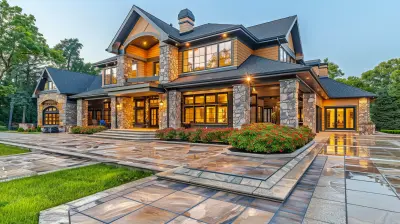24 January 2025
The housing market. It’s something we all love to hate, isn’t it? Whether you're renting an apartment, saving for your dream home, or scrolling through Zillow just for fun (no judgment), housing costs are probably a hot topic in your life. And if you're feeling like it’s getting tougher to find a place that doesn’t drain your entire paycheck, you’re not alone.
Enter rent control – the term that gets thrown around like confetti in housing debates. But what does it actually mean? And more importantly, does it really make housing more affordable? Let’s dive into the world of rent control to figure out if it’s the knight in shining armor a lot of renters make it out to be… or just another band-aid for a bigger issue. 
What Is Rent Control, Anyway?
Okay, so let’s break this down in plain English. Rent control is like putting a price cap on what landlords can charge for rent. It’s a policy designed to keep rents from skyrocketing and squeezing tenants dry. Think of it like a thermostat for the rental market – it limits how “hot” the rent can get.Rent control laws vary depending on where you are, but they usually do two things:
1. Set a maximum limit on how much rent can be charged. This is often based on the property's size, age, or location.
2. Restrict how much landlords can raise rent each year. So, if your landlord wants to jack up the rent by 20% overnight, rent control says, “Not so fast!”
Sounds great, right? Affordable rent, predictable increases – what’s not to love? Well, as it turns out, there’s a bit more to the story. 
Why Rent Control Sounds Like a Dream
If you’re a renter, rent control can feel like winning the apartment lottery. Let’s be real – who doesn’t want more cash in their pocket? Here are some of the biggest perks:1. Stable Rent = Less Stress
Imagine knowing your rent isn’t going to double next year. Ah, sweet relief! With rent control, tenants can budget for housing without constantly sweating over surprise rent hikes.2. Affordable Housing for Low-Income Families
For many families, paying rent is already tough enough. Rent control makes it possible for them to stay in their communities without being priced out.3. Community Stability
When people can afford to stay put, neighborhoods thrive. Schools, businesses, and local networks all benefit when families don’t have to pack up and move every couple of years.
The Flip Side: Why Landlords Love to Hate Rent Control
Of course, not everyone’s a fan. For landlords, rent control can feel like being handed a recipe for financial headaches. And let's face it, no policy is perfect. Critics of rent control often point out these downsides:1. Maintenance Nightmares
Think about it – if a landlord isn’t earning much from a property, where’s the money for repairs going to come from? Some argue that rent control discourages property owners from keeping apartments in tip-top shape. Why fix it up if you’re not making a profit?2. Fewer Apartments on the Market
Here’s a little economics 101: when landlords can’t charge competitive rents, they might pull their properties from the rental market entirely. This creates a shortage of available housing, which can actually push prices up in the overall market.3. It Doesn't Help Everyone
Here’s a tricky part: rent control only benefits tenants lucky enough to snag a rent-controlled unit. New renters or people moving to the area? They’re often out of luck.
So… Does Rent Control Actually Work?
Ah, the million-dollar question (or depending on where you live, the billion-dollar question). Does rent control actually make housing more affordable?Well, it depends. Rent control is a bit like your favorite comfort food – it fills a need for some people, but it’s not exactly a balanced diet.
1. Short-Term Solution, Long-Term Problems
For tenants currently living in rent-controlled units, the benefits are obvious. But over time, critics argue that rent control puts a strain on the housing market. Landlords may convert rental properties into condos or find loopholes to push tenants out, leading to fewer affordable rentals in the long run.2. Where You Live Matters
Rent control has been more successful in some places than others. Cities like New York and San Francisco have long histories with rent control, and yet they also have some of the most expensive housing markets in the U.S. Meanwhile, some economists argue that cities without rent control, like Houston, have healthier rental markets because landlords have more incentive to build and maintain properties.What’s the Alternative?
If rent control isn’t the cure-all for affordable housing, what is? It’s a tough nut to crack because housing affordability is a multi-faceted issue. Here are a few alternative ideas experts toss around:1. Building More Housing
The old “supply and demand” argument. The more apartments and homes we build, the cheaper they’ll become – in theory, anyway. Of course, zoning laws and construction costs can get in the way.2. Subsidies for Renters
Instead of capping rents, some cities provide financial assistance directly to renters. Think of it as a helping hand for low-income families who still want the freedom to choose where they live.3. Incentives for Landlords
What if landlords were rewarded for providing affordable housing instead of being restricted by rent caps? Tax breaks and grants could encourage property owners to keep rents low while maintaining their buildings.Why Rent Control Is Still So Controversial
Here’s the thing: rent control touches on the deeply personal issue of where we call “home.” For tenants, it can mean the difference between being able to stay in their neighborhood or being forced to move. For landlords, it can mean struggling to make a profit in a competitive market.And let’s not forget that housing policy isn’t just about economics – it’s also about politics, culture, and a whole lot of emotions. People love their homes. They fight for their homes. And that’s why rent control debates get so heated.
The Bottom Line
So, is rent control the magic wand that makes housing affordable? Probably not. But is it a helpful tool for some renters in certain situations? Absolutely.At the end of the day, rent control is just one piece of a much larger puzzle. Affordable housing isn’t a one-size-fits-all problem, and it’s going to take a mix of solutions to make a real dent in the issue.
But hey, understanding rent control is a good start, right? So, the next time someone brings it up at a dinner party, you can nod along confidently and maybe even drop a fun analogy. (Rent control is like putting a band-aid on a leaky pipe – it helps in the short term, but it doesn’t fix the root problem.)
And who knows? One day, we might just figure out that perfect recipe for making housing affordable and accessible for everyone. Until then, rent control will likely remain both a hero and a villain in the housing world, depending on who you ask.










Kara Bailey
Rent control can stabilize communities and protect tenants, but may discourage new housing supply, complicating the affordable housing crisis further.
April 6, 2025 at 8:58 PM